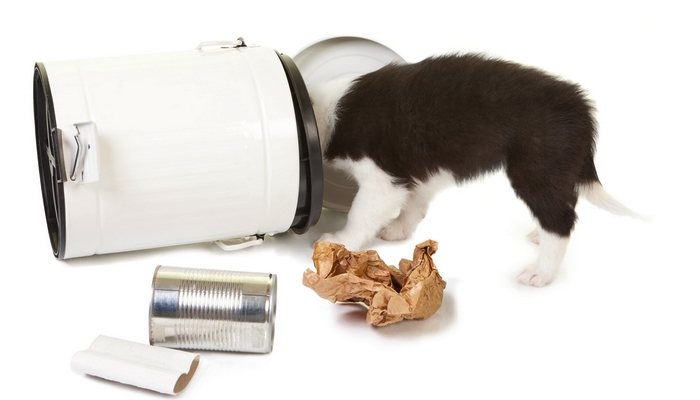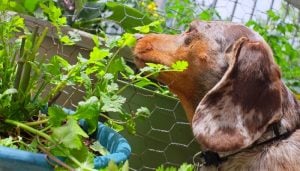I’ve heard the advice that new parents should literally crawl around their home to get an idea of what their growing toddler might get into. Our dogs and puppies are often thought of as our little, furry children, right? It should be no surprise that we need to parent them with the same kind of attention to safety, and pet proofing your home is a big part of that.
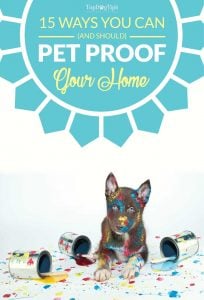 Pet proofing your house isn’t something you’ll do just once when you bring home a new dog or puppy. It’s about creating good everyday habits. Keeping your dog safe can add years to his life. No one should have to live with the burden of knowing that a dog's injury or death could have been prevented with a bit of household preparation or awareness.
Pet proofing your house isn’t something you’ll do just once when you bring home a new dog or puppy. It’s about creating good everyday habits. Keeping your dog safe can add years to his life. No one should have to live with the burden of knowing that a dog's injury or death could have been prevented with a bit of household preparation or awareness.
You probably wouldn’t put your dog in danger deliberately, but a second’s thoughtlessness is all it takes. Always be prepared for accidents and injuries as much as possible. Keep emergency phone numbers like your veterinarian and pet poison control by the phone, and keep basic first-aid items and medical records handy.
ALSO READ: 15 Must-Know Tips for New Dog Owners
15 Tips on Pet Proofing Your Home in Preparation for a New Dog
1. Dogs aren't the only ones who need furniture rules
Reclining furniture and rocking chairs can be really dangerous to pets. Small dogs and puppies can get caught underneath, while you’re still stuck in the chair. They can fall off beds and couches too. Always be aware of where your dog is and if it's a safe place to be.
2. Watch the stairs
Puppies aren’t born graceful or coordinated. Even if they’ve learned how to go up and down, they can still have an accident and fall down the stairs. That can be an issue with older dogs too, as they lose mobility in their senior years.
Keep your pets away from the stairs, until you're sure it won’t be a problem. Use a pet gate to block stairs and other unwanted areas. Train your dog that the stairs aren’t a place to play or chase either. Pet gates for dogs usually work best, especially for puppies. Watch the comparison video of the best dog gates to see how they work.
3. Does dust make you sneeze? You aren’t the only one
Dogs are a lot closer to the ground than we are, and they can be allergic or irritated by dust, just like people. Keeping your home clean and tidy is a great way to keep your dog safe, prevent accidents and reduce allergens for you both.
4. If it’s within their reach, your dogs think it's fair-game
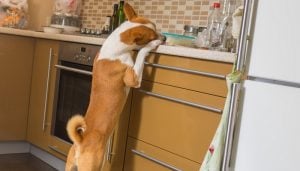 Pick up clothes, shoes, and tissues, or anything else lying around. Dogs can’t always tell a child’s toy from one of theirs either. Throw pillows, candles, coffee table decorations and house plants can all become targets. Garbage cans will always be attractive too because they’re full of food smells.
Pick up clothes, shoes, and tissues, or anything else lying around. Dogs can’t always tell a child’s toy from one of theirs either. Throw pillows, candles, coffee table decorations and house plants can all become targets. Garbage cans will always be attractive too because they’re full of food smells.
I wouldn't completely trust training to curb your dog’s natural instinct. It’s better to put a latch on the cupboard or garbage can. Dog safety needs extra consideration around the holidays too, with presents and other decorations.
READ THIS: 15 Reasons to Consider Pet Safety Gates for Your Dog
5. Keep cords and wires away from the pet
Don’t expect your puppy or dog to know that cords and wires aren’t toy ropes. Power cords could electrocute your dog or he could hang himself with the cord for the blinds. You can buy special protectors for cords that are too easily accessible, but it might be a good idea to put away your favorite lamp until your dog is done teething and understands the house rules.
6. Keep medicines out of reach
Childproof medicine bottles and pill organizers are not necessarily pet proof. It might seem natural to keep your pills on the counter, a table or night stand, but ingestion of vitamins, over-the-counter pills and prescription drugs can be fatal to your pup. If you have a house guest, make sure they have a safe place to store medicines and toiletries away from the dog, too.
7. Make a clean sweep in your house
Keep all cleaning products and chemicals like paint or nail polish remover in a safe place, away from your pet. Natural cleaning products can be poisonous to a dog. Put them out of reach, in a latched closet, or child-proof cupboard.
Follow any instructions on product labels for safe use and storage. Don’t take the unnecessary risk that your dog won’t open the door, or get into packaging and containers. It's not uncommon for dogs to learn how to open cabinet doors under the sink, so if you're going to store cleaning products there be sure to get a lock for the cabinet doors.
RELATED: Best Flooring for Dog Safety According to Science
8. Bathroom habits for you and your dog(s)
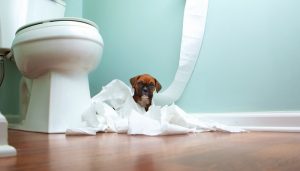 If you have a dog or other pet, the argument about keeping the toilet lid up or down just got settled for good. Dogs love to drink out of the toilet, and if you frequently leave cleaner inside to soak or use a product to clean with every flush, it’s laced with poisons.
If you have a dog or other pet, the argument about keeping the toilet lid up or down just got settled for good. Dogs love to drink out of the toilet, and if you frequently leave cleaner inside to soak or use a product to clean with every flush, it’s laced with poisons.
Leave-on shower spray and other cleaners might smell interesting enough to lick, too. You might even need to invest in a baby proof latch for the toilet and\or keep the bathroom door shut.
9. Keep your dog out of the litter box
Not only is it bound to make the family cat furious, cat feces can make puppies and dogs sick or spread intestinal parasites. Cats can usually jump over a baby gate, but curious puppies can’t.
You may need to get creative to give your cat the bathroom privacy she needs by putting the box on a platform or in an area of the house the dog can’t enter. If you have a cat at home and just bringing in a new dog, I recommend watching this video on how to introduce a dog to a cat for safety tips.
10. Garages and sheds can have dangerous items
You need to store tools, building materials and outdoor liquids (like antifreeze and motor oil) safely. Don’t keep things like gas cans, pool chemicals or fertilizer on the floor, where they’ll be easily accessible to your pet.
Even if you think the dog won’t be going into these areas, there’s always a chance someone might leave the door open and expose your puppies to potential hazards. Once again, use pet gates can prevent your curious pup from investigating areas that may be completely unsafe and dangerous for your new dog.
11. Your lawn and garden need to be pet-safe
Fertilizers, insecticides and herbicides might make your garden the envy of the neighborhood, but you never know what your dog will put in his mouth or try to eat. Lawn chemicals get on their paws and fur, and from there it’s just one lick away.
It’s best to avoid these types of products in areas your dog uses. Check to make sure you aren’t growing plants or berries that are poisonous to your dog (see ASPCA list). Many common garden plants can be poisonous to dogs, including:
12. Know when to butt out
Smoking outside has grown in popularity now that people are more aware of the dangers of secondhand smoke, which is as bad for dogs as it is for people. Cigarette butts, ashtrays, pipes and packages of tobacco products all need to be kept away from your dog and out of his mouth. They are very hazardous to pets.
13. Winter walks can carry their own toxins
Road salt and ice melting chemicals can soak your dog's feet in slushy weather or collect on his pads and fur. This can cause painful irritation and make your Fido sick when he licks his paws. There are pet-friendly ice melts that you can use instead, of course.
However, you still need to make cleaning your puppy's paws and stomach with a wet wash cloth after a walk an all-year-round habit. You may also want to consider purchasing a set of dog shoes for him as well that will provide extra protection for his paws.
14. Water safety for your pet
Pool can be dangerous to dogs as well. Even if your dog can swim, make sure he doesn’t have easy access to the pool, or use it as one giant water dish. Remember that chlorine can be very irritating to his fur, so if he does jump in, he’ll need a good rinse after.
15. Dogs also love a good party or a tasty backyard BBQ
Some dog-people love to bring their pets everywhere, but it isn’t always a picnic. Dogs need to be kept away from food that’s been put out for guests, alcoholic beverages, and garbage like paper plates.
There are a variety of food and drinks that will make a dog sick including chocolate, caffeine and artificial sweeteners. Special events mean a lot of guests around that might not have your curious dog in mind, and your daily habits around food should also be adjusted to keep your dog safe.
READ NEXT: 25 Most Serious Dog Health Symptoms That Cannot Be Ignored


